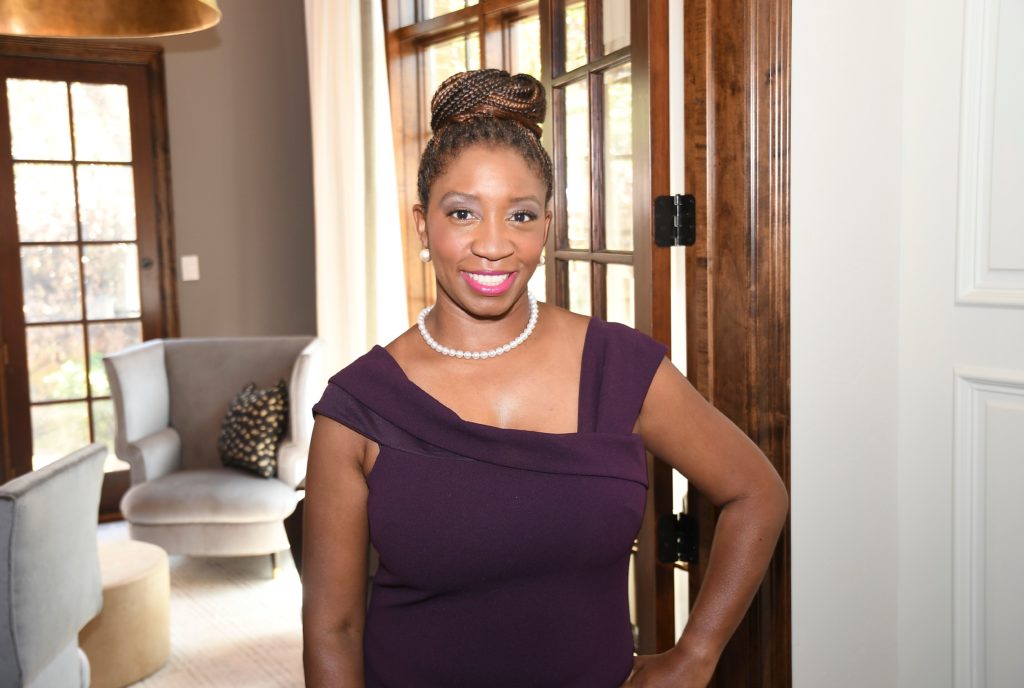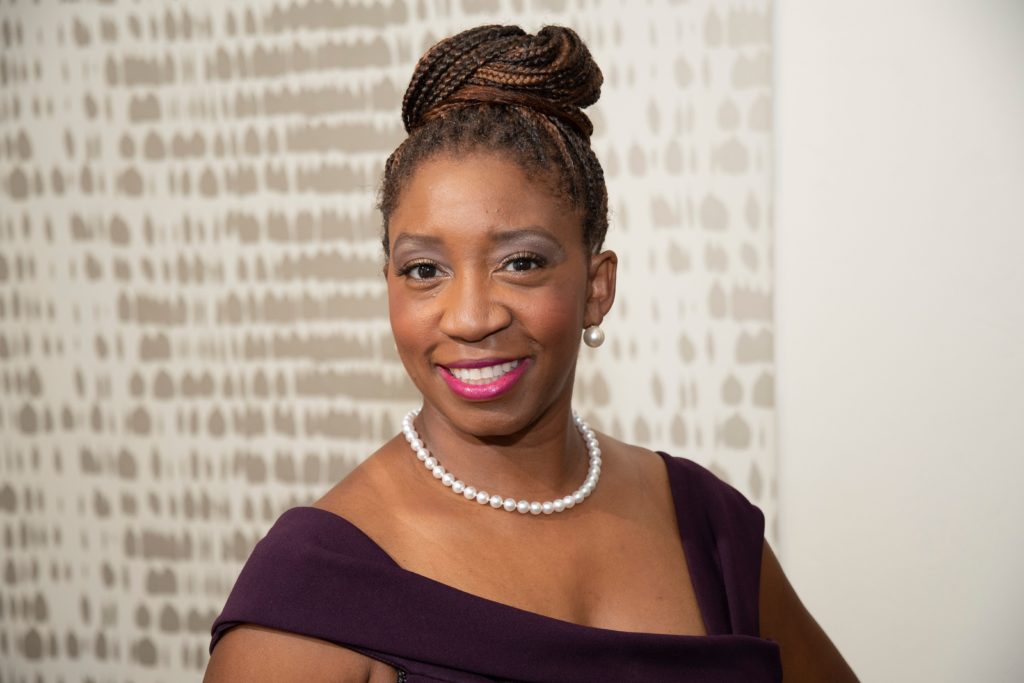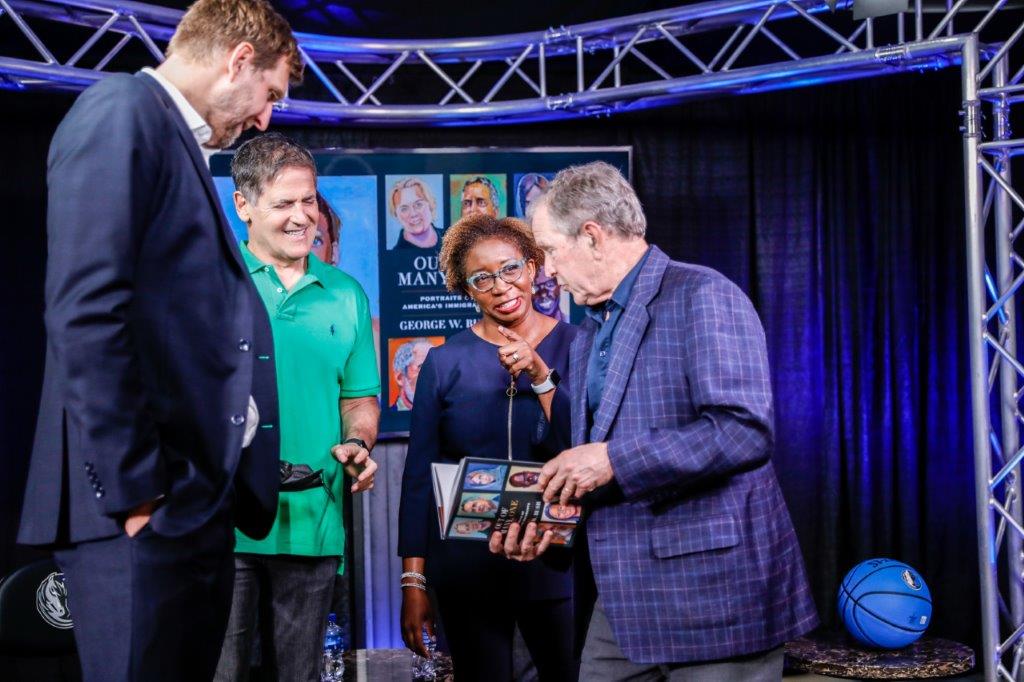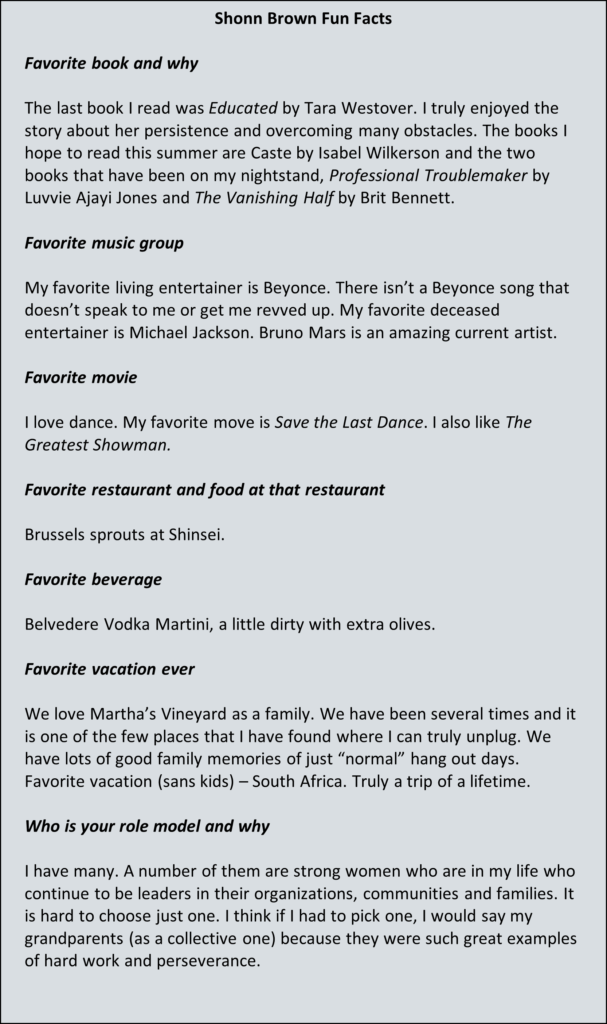
Shonn Brown was 12 years old and walking home from school in Lake Highlands when a car of white men drove by. They called her the N-word and then sprayed her with orange soda.
“I remember racing home. I was afraid to tell my family,” Brown said. “I changed clothes and got rid of the stained clothes. That was the first time I felt different.”
Fast-forward 35 years – a Friday night last May – when Brown learned that her 17-year-old son and his friends – all African American young people out celebrating the end of the school year by ordering food and slushes – were confronted by a manager at a Sonic Drive-In in North Dallas who threatened to call the police on them if they didn’t leave the premises. The manager made no such warning to the white teens next to them.
“This is my life. This is my Black son’s life. This is our reality,” Brown wrote on Facebook a few days later. “You may think that folks like George Floyd are distant stories in the media. This is my experience. Every. Single. Day.”
The post detailing the racial-profiling incident was shared hundreds of times. Numerous news media outlets reported what happened. A drive-through protest of hundreds of cars occurred a few days later. Sonic officials issued an apology.
Now a year later, Brown, who is a highly successful commercial trial lawyer and now deputy general counsel at Irving-based Kimberly-Clark Corporation, said she was pleased to see the reaction of the Dallas community to the incident.
“It was an opportunity to demonstrate what I had shared with friends and colleagues for many years,” she said. “Their shock did take me by surprise because I then understood that they could not truly believe what I had warned them would be the case was truly my reality. I am observing to see if that was a moment or the spark for a movement as we are again seeing an overwhelming number of reports of injustices against young Black and Brown people.”
Since joining Kimberly-Clark in March 2019, Brown and her team have scored some huge litigation successes, including having a substantial class action verdict reversed and the dismissal of a shareholder derivative and securities class action.
PREMIUM SUBSCRIBERS: TO FIND A SPECIAL Q&A WITH SHONN BROWN CLICK HERE.
Citing Brown’s success in the courtroom winning major verdicts for plaintiffs and defendants and her dedication to addressing inequality, discrimination and social justice issues, the Association of Corporate Counsel’s DFW Chapter and The Texas Lawbook have named Brown a 2020 DFW Outstanding Corporate Counsel Award finalist for two separate categories – Senior Counsel of the Year for a Large Legal Department and Achievement in Diversity and Inclusion.
“During her Kimberly-Clark tenure, Shonn has mastered the nuances of the company’s businesses and absorbed its culture,” said Sidley Austin partner Angela Zambrano, who nominated Brown for the award. “Making her mark as a business advisor as well as a legal advocate, Shonn has developed and leveraged opportunities that focus on providing value to and partnering with clients around the world.
“Throughout the arc of her career, Shonn has remained committed to helping others advance to significant leadership positions, with a laser focus on empowering girls and women,” Zambrano said.

Brown, board chair of the Texas Women’s Foundation, moderated a Dallas Mavs The HUDDLE conversation on May 6 on the power of American immigrants with 43rd President George W. Bush, Dirk Nowitzki and Mark Cuban
Paul Genender, a partner at Weil, Gotshal & Manges, said he has seen Brown thrive in the Texas legal community.
“Beyond her exceptional advocacy work over a more than two-decade career, I have also witnessed Shonn serving as a natural leader and motivator, as well as a zealous advocate for equality, with an emphasis on gender and racial equity,” said Genender , who also nominated Brown for the Corporate Counsel Award. “Shonn does much more than just champion the cause of diversity and inclusion through words. She takes action, rallies others to do likewise and truly moves the needle for diversity and inclusion in many spheres.”
Both Zambrano and Genender point out that Brown is a huge supporter of the Dallas Bar Association’s Equal Access to Justice initiatives.
ACC DFW and The Lawbook are celebrating the finalists and announcing the winners at the annual DFW Outstanding Corporate Counsel Awards ceremony June 3 at the George W. Bush Institute.
Brown was born in Dallas and raised by her maternal grandparents. Her grandmother was an educator and a musician. Her grandfather was a Korean War veteran who worked as an aircraft mechanic at Addison Airport. Her father operated a dry cleaning business in South Dallas for many years. Her mother, who was an ordained minister and licensed cosmetologist and worked at Texas Instruments and Haggar Slack company, died in a car crash in 2016.
“My formative years were filled with a number of notable experiences that would put me as an at-risk student,” Brown said. “I would say upon reflection that many of those experiences while difficult growing up have shaped me and forced a certain resilience.
“Losing my mother in 2016 was definitely transitional for me, and from that point I have not only been more authentic and open about hardships that I experienced but I have been more intentional about the way I spend my time and energy,” she said.
Brown first started thinking about becoming a lawyer when she was 8 years old, though she also thought about being a dancer, too.
“I don’t know what sparked that interest,” she said. “However, from the time I articulated it, my family and I marched toward that goal.”
Brown received a bachelor’s degree in sociology from Southern Methodist University in 1995 and her law degree from SMU three years later.
She remembers her grandfather taking her to the SMU campus and telling her that he couldn’t even walk in the University Park area when he was younger.
“Don’t stand outside the institution and throw rocks at it,” her grandfather told her. “Get on the inside, get a seat at the table and make change from the inside out.”
Brown did exactly that, getting involved with student government. Little did she know that two decades later, the SMU Dedman School of Law would honor her with the Distinguished Alumni Award.

In 1998, the Dallas-based corporate law firm Locke Lord recruited and hired Brown, where she stayed for 14 years and made partner.
Brown’s first jury trial came in 2002 when she was second chair to partner Jerry Clements in state district court in Harris County. The client was a family-owned business that focused on travel. The company was being sued by an employee who was claiming she was responsible for profits generated from internet bookings.
The eight-day trial was memorable for other reasons. The jury ruled against her client, but the judge reversed stating the evidence did not match the verdict.
On the morning Brown and Clements were heading to Houston to start the trial, Brown learned she was pregnant.
“I remember getting the test results around 6:15 a.m., waking my husband to tell him the news and then running out the door,” she said. “Thus, the never-to-be-achieved ‘work-life balance’ journey began.”
Brown is married to Kronos Worldwide General Counsel Clarence Brown.
Brown said she loved her time in Big Law at Locke Lord, but she wanted more opportunities to be in the courtroom. In 2012, Brown jumped to the litigation boutique Gruber Hurst Elrod in 2012. Four years later, Brown and partner Michael Hurst moved their trial practice Lynn Pinker Hurst & Schwegmann, where she stayed for three years.
During her two-decade career as a trial attorney, Brown has scored several huge courtroom victories, including:
- In 2013, Brown and Hurst convinced a federal court jury in Fort Worth to order the Keller Independent School District to pay $1 million to their disabled teenaged client, Terrence Rideau, who was repeatedly beaten and abused while at school, even after school leaders were told about the problem many times. It is believed to be the first time that a public school in the U.S. was held accountable for intentional discrimination under the Americans with Disabilities Act.
- Brown and Hurst represented Ray Hunt and Hunt Consolidated in a fraud trial in 2014 that resulted in a $1.4 million jury verdict for her client.
- She successfully defended the Dallas hedge fund Highland Capital in a nine-week jury trial related to the departure and taking of business opportunities by several executive leaders.
Brown said the case against Keller ISD may not have been her largest courtroom win ranked by dollar value, but it was incredibly important.
“This is one of the most meaningful victories for me because we represented a client who could not speak for himself or tell his story,” she said. “It is an amazing story of a resilient mother who used the court system to effectuate change and ultimately fought for her son and other students with special needs in the public school system. We received what is believed to be one of the largest civil rights verdicts of that year.”
Representing a client in front of a jury can be intense, Brown said, but she loved it.
“Figuring out the best way to tell the story. Juries relate to stories and real people,” she said. “While I represented some individuals, I generally represented companies. With that representation came a responsibility to have the judge and jury relate to the human nature of the organization. Who are they? Why do they exist? Their reason to be here.
“Coming up with the way to share and deliver that story, the character and personality of an organization to make them come alive as a person was a great highlight for me,” she said.

President George W. Bush discussed his new book Out of Many, One: Portraits of America’s Immigrants at the May 6 Dallas Mavs Huddle event with Brown, Mavs owner Mark Cuban and Mavs legend Dirk Nowitzki
While Brown said she loved her trial law practice, the ability to go in-house at such a large and progressive business as Kimberly-Clark as deputy general counsel for litigation, regulatory and preventive law was too good to turn down.
“Kimberly-Clark provided an opportunity for me to sharpen my skills as a value-added partner with the business,” she said. “The opportunity to take my analytical skills and experience from private practice was extremely attractive. Taking my practice to a global platform was also key.
“Kimberly-Clark’s mission and focus on making consumers’ lives better,” she said. “We are true to that mission and that aligned with my own personal goals and interests.”
Kimberly-Clark, which has operations in 175 countries and annual revenues of more than $18 billion, employs about 100 lawyers in-house and has an annual legal budget of about $110 million.
Brown currently has about 200 civil litigation matters on her docket, including a couple consumer class actions and about 50 employment disputes.
“Class action cases may not be substantive, but they are incredibly time consuming and expensive,” she said.
Brown said that her biggest achievements so far at Kimberly-Clark involve “gaining the confidence and trust of my business partners as a go-to front-line protector of the organization.”
“Often litigation teams and legal teams as a whole can be pulled in on a need-to-know basis,” she said. “Our legal team is focused on value delivery, and we do that best when we can work with the business knowing their goals and challenges on the front end. Within two years I have solidified strong relationships with our business stakeholders delivering significant value back to the business.”
A few years ago, Brown decided to develop a personal mission statement for herself. She was being asked to participate or be involved in so many organizations and charities that she “found myself going in a thousand directions.”
“OK, Shonn, What is important to you? If you passed, what would you want people to say about you?” she asked herself.

The answer: the empowerment of women and girls was top of the list.
“Education is a game-changer,” Brown told the Dallas Business Journal in an interview. “And the arts are important because it balances your being. Having a focus allowed me to identify the right places to make an impact and go deeper rather than thinly spreading across the board.”
Brown said diversity and discrimination remains a major issue. She said that while “overt actions and more prominent statements or behaviors are muted, there are still vestiges of a system that historically did not benefit women and [Black, Indigenous and people of color).
“The notion that just focusing on the merits and ability alone is enough is not sufficient to address the systemic issue,” she said. “Intentional action regarding the elevation, support, participation and advancement of women and BIPOC lawyers is necessary. Using the same system and same practices will yield the same results. This cannot be passive, it must be active.”
Sidley’s Zambrano said that Brown and Kimberly-Clark are a perfect fit.
“Kimberly-Clark has a strong reputation as a good corporate citizen and for its commitment to diversity and inclusion,” Zambrano said. “Its core values of authenticity, accountability, innovation and caring are well aligned with Shonn’s own personal and professional goals.”
Zambrano and Genender said Brown’s handling of the discriminatory event at Sonic last May involving her teenaged son demonstrated how she does not hesitate to stand up but also shows that she knows how to make such incidents into teaching moments for change.
“I was especially impressed to see Shonn take corrective action in a very systematic way, making this a learning experience not just for people of color, but for the entire community,” Genender said. “Shonn took this opportunity to show people without racial animus how to identify and call out hidden racism; moreover, she did so in a very skillful way, along with some of her friends and allies.”
Hurst, who practiced with Brown for seven years, said his former law partner has always been someone who “puts her words into action.”
“When Shonn commits to doing anything – for her kids, their schools, an organization, her clients, the legal profession – she will do it better than anyone else,” Hurst said. “She is driven by fear of failure, compassion, social injustice and the drive to make a difference during her lifetime.
“While Shonn is strong, and tough and not someone you would want to cross, she is forgiving,” he said. “There is a lot I love about Shonn, and while she won’t take crap from anyone, she also has a heart for forgiveness.”
